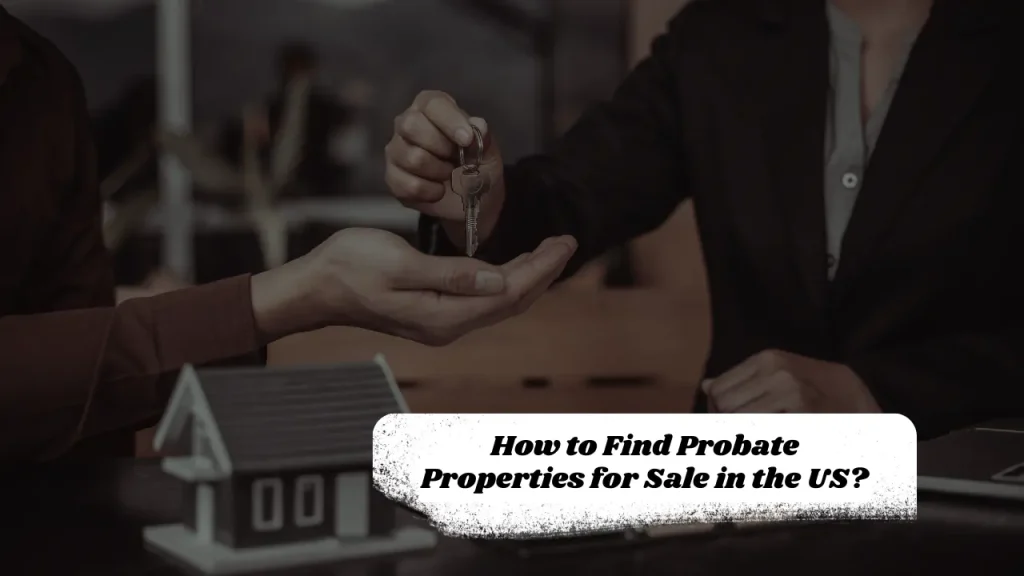How to Find Probate Properties for Sale in the US?
Probate properties can be a goldmine for real estate investors and homebuyers looking for great deals. These properties are often sold below market value, making them an attractive option. However, finding probate properties requires a bit of research and strategy. In this guide, we’ll walk you through everything you need to know about finding probate properties for sale in the US, including tips, tools, and resources to help you succeed.
In this guide, we’ll break down the process of locating probate properties, where to search, and how to navigate legal requirements to secure the best deals.
What Are Probate Properties?
Probate properties are real estate assets owned by a deceased person and are sold during the probate process—a court-supervised procedure to settle debts and distribute assets to heirs. These sales occur when:
- The deceased had no will (intestate estates)
- The will mandates the sale of the property
- The heirs decide to liquidate the estate
Since heirs often prefer a quick sale to settle debts and distribute proceeds, these properties are typically priced below market value, making them attractive for buyers.
Why Invest in Probate Properties?
- Below-Market Prices: Probate properties are often sold at a discount.
- Less Competition: Many buyers overlook probate properties, reducing competition.
- Motivated Sellers: Executors or heirs are often eager to sell quickly.
- Potential for High Returns: With some renovations, these properties can yield significant profits.
Related article for you:
How Long Does Probate Take in Missouri? A Complete Guide with Timelines & Tips

Where to Find Probate Properties for Sale
1. Public Probate Records & County Courthouse Searches
Most probate filings are public records, meaning you can access them through your local county clerk’s office or online portals.
How to Search Probate Records:
- Visit the County Courthouse: Go to the probate division and request records of recent probate cases.
- Check Online Probate Records: Some counties have digital databases where you can search probate cases by the deceased’s name.
- Identify Real Estate Holdings: Look for cases that include real estate assets.
Example: Many counties, like Los Angeles (L.A. County Probate Records), allow online searches.
2. Networking with Probate Attorneys and Estate Executors
Probate attorneys handle estates and can provide leads on upcoming probate sales. Building relationships with these professionals can give you exclusive access to probate properties before they hit the open market.
Tips to Connect:
- Attend local estate planning and probate attorney seminars.
- Reach out to attorneys specializing in probate cases.
- Offer your services as a buyer to assist in quick property sales.
3. Real Estate Agents Specializing in Probate Sales
Some real estate agents specialize in probate sales and can help you find off-market deals.
How to Find Probate Real Estate Agents:
- Look for agents with a Certified Probate Real Estate Specialist (CPRES) designation.
- Search probate real estate listings on major property sites like Zillow or Realtor.com.
- Check LinkedIn and local real estate networks for probate experts.
4. Public Notices and Newspapers
Probate courts often require estate executors to publish notices about upcoming property sales. You can find these in:
- Legal notice sections of newspapers
- Online public notice websites like PublicNoticeAds.com
- Local county government websites
5. Estate Sales and Probate Auctions
Estate sales often include not just personal belongings but real estate as well. Probate auctions allow buyers to bid on probate properties, often leading to great deals.
Where to Look:
- Auction Websites: Platforms like Auction.com list probate and foreclosure properties.
- County Probate Auctions: Many counties conduct public probate property auctions.
6. Direct Outreach to Heirs
If you identify an estate going through probate, you can reach out directly to the heirs or executors. A polite, professional approach may help you secure a deal before the property is listed publicly.
How to Approach:
- Express interest in helping them sell quickly.
- Offer to pay in cash for a fast transaction.
- Ensure you remain sensitive and respectful in your outreach.
Steps to Buying a Probate Property
Once you find a probate property, here’s how to proceed:
1. Research the Property
- Assess market value through Zillow, Redfin, or real estate agents.
- Investigate any outstanding debts or liens.
2. Submit an Offer
- Some probate sales require court approval.
- Expect a bidding process, especially in competitive markets.
3. Attend the Court Confirmation Hearing (if required)
- Some states require probate sales to be approved in court, allowing other buyers to bid.
4. Finalize the Purchase
- Ensure all paperwork complies with local probate laws.
- Close the deal once the court and executor approve the sale.
Pros and Cons of Buying Probate Properties
✅ Pros:
- Often below market value
- Less competition than traditional listings
- Potential for high returns on investment
❌ Cons:
- Can be a lengthy process
- Properties may need significant repairs
- Some sales require court confirmation
Conclusion Is Buying Probate Property Worth It?
Finding probate properties for sale in the U.S. requires patience and strategy, but the potential rewards make it worthwhile. By leveraging public records, working with probate professionals, and attending estate sales, you can uncover valuable real estate opportunities. Whether you’re an investor or a homebuyer, probate properties can provide significant savings and investment potential.
For more resources, check out:
With the right approach, probate properties can be a game-changer for your real estate portfolio!
About the Author

Sarah Klein, JD, is an experienced estate planning attorney who has helped clients with wills, trusts, powers of attorney, and probate matters. At All About Lawyer, she simplifies complex estate laws so families can protect their assets, plan ahead, and avoid legal headaches during life’s most sensitive moments.
Read more about Sarah
